- Home
- Richard Matheson
Backteria and Other Improbable Tales Page 9
Backteria and Other Improbable Tales Read online
Page 9
He jammed his eyes shut. “Con-trol,” he muttered between gritted teeth.
A few minutes later Rachel flicked off the bathroom light and padded back to bed. Harold pretended to sleep. He felt the mattress yield beneath her settling weight, then heard the lamp switched off.
He opened his eyes. Next to him Rachel was twisting onto her side with a delicate sigh. He turned his head a bit and saw the dark outline of her beside him. He could reach out and—
Empathy twitched his hand. He forced his lids shut and counted. One-two-three-four—
“Yi!”
A gasping Rachel jerked her hand back from his chest.
“What are you doing?” demanded Harold.
“I was just going to—to kiss you goodnight,” said Rachel. “Why?”
“Nothing. Nothing.”
“Are you cold?”
“Of course not.”
“You’re shivering.”
“I am not shivering.”
“Well, you needn’t shout.”
“I am not shouting!”
“You are.”
Harold flung back the bedclothes and lurched to his feet.
“Where are you going?” asked Rachel.
“To get a drink of water! Do you mind!”
He stood twitching on the bathroom tiles and staring at his dazed reflection. This was abominable. That booklet was turning him into a ravening beast! What would poor Rachel think?
He’d read; that was it. There were those other booklets: Sorghum Culture, The Poultry Grading Manual and The Romance Of Grapefruit Pits. He’d replace tainted thought with wholesome information, that’s what he’d do.
His hand trembled in the pocket of his topcoat as he reached down for the envelope.
“You all right?” asked Rachel from the bed.
“Yes. I’m all right.”
He went downstairs to the livingroom and turned on his reading lamp. Now…
He sat numbly in his armchair staring at the letter.
Enclosed find three of the four booklets you ordered. We have on our list no booklet entitled Exciting Sex Practices In 1984 ½.
Harold blinked. But this was inexplicable. He’d already received the booklet. If the government hadn’t sent it, then who—?
“Harold?”
His head jerked up. Rachel was standing on the bottom step, looking at him.
It came to him.
“Impossible,” he said.
Rachel lowered her green eyes. “I—guess you know,” she murmured.
“Impossible,” said Harold.
“Well, you’re impossible too!” Rachel flared. “You and those booklets of yours! We’re supposed to be married, Harold. Married!”
He gaped at her. “But…how?” he asked.
“Oh.” Rachel shrugged. “What’s the difference? I had a counterfeit bulletin printed and burned the real one when it was delivered that day. I had the booklet printed.”
“But—”
“I mailed it to your office,” she anticipated his question, “because I knew you wouldn’t have it sent here.”
“Oh,” he said.
He stared at her.
“Well?” she defied.
“Those things,” he said, hollowly. “Where—that is, how—?”
“Oh, I made them up,” said Rachel pettishly.
“All of them?”
“I hate to disillusion you, Harold,” she said, turning away, “but I haven’t been living in a closet all my life.”
“Wait.”
She turned as he stood and took a hesitant step toward her. “It’s just,” he said, “—just that I always thought—”
“What too many men think,” she finished for him. “That a wife isn’t a woman.”
Harold lowered his head. “You’re right,” he admitted, “I-I—”
When he looked up she was smiling at him, one hand outstretched for his.
“It’s never,” she reminded, “too late.”
“But how did you know I’d send for it,” he asked a little later.
“I just assumed you would,” she said. “If you hadn’t I’d have really been worried.”
“I didn’t really say ‘I will send for it’ that night, did I?”
“Well,” she confessed. “Maybe I did - prod you a little.”
“Double flip-flop indeed,” said Harold. Rachel giggled.
“Only one thing I don’t understand,” he said. “Where did you get 1984 ½?”
When she told him he clapped himself on the forehead.
“I am dense,” he said.
Rachel laughed softly. “So you thought it meant the future?” she asked.
“Yes.”
“How does it feel?” she asked, “to be the first time traveler?”
“I like it,” murmured Harold, reaching for her again.
And there they were in 1984 ½—Victory Boulevard, Los Angeles, California.
Pride
The flight from Honolulu arrived in Los Angeles at four-fifteen p.m. Bob stood up from his seat and took down their overnight bags from the bin, putting them on his seat. He smiled at Jeanne. “Nice flight,” he said.
“We didn’t have to go first class,” she told him. “That was very extravagant of you.”
“Are you kidding?” He chuckled. “On our honeymoon? Come on.”
“I know but—”
She stood up beside him while everyone waited for the front exit door to open. Bob put an arm around her and kissed her on the cheek. “Have a good time?” he asked.
“I had a wonderful time,” she said.
“Good.” He put both arms around her and gave her a big kiss on the lips. The other passengers in First Class smiled and some of them clapped.
“Bob…” Jean was blushing. “Not here.”
“Don’t be silly,” he said with mock sternness. “You’re my wife now. I can kiss you anytime I want.”
She smiled, embarrassed. “I know,” she said.
“You’re mine now, babe,” he said.
She drew in a trembling breath. “I am,” she whispered.
The limousine driver was waiting for them as they exited the terminal. He was holding up a card that read THOMPSON. He smiled at them and took their overnight bags. “Have a good flight?” he asked.
“Had a perfect flight,” Bob told him.
“Good,” the limousine driver nodded and smiled.
They followed him through the terminal, heading for the luggage carousel.
“A limo too,” Jeanne murmured. “They’re so expensive.”
“Enough, enough,” Bob scolded her. “This was our honeymoon. It had to be first class all the way.”
“It was, darling, it was,” she said.
“Especially you know what,” he said, suppressing a grin.
“Shh.” Jean looked embarrassed again.
Bob laughed. “You’re too much,” he said. “You act as though we just met.”
She leaned in close to him and whispered into his ear. “I almost gave in when we first met too,” she confessed.
He put an arm around her and squeezed her tightly. “It’s my devilish charm,” he said.
She made a face. “It’s something,” she answered.
Bob laughed again, this time in satisfaction.
They sat close together in the limousine, Bob’s hand gripping her legs. Once he started to move it up to her groin she gasped in shocked surprise. “Bob,” she murmured.
He looked at her with hooded eyes. “Why not?” he asked. “Why not right here? The driver is way up in front, he won’t see.” He reached down and started to unzip his pants.
“Bob, for God’s sake,” she whispered urgently. “Are you out of your mind?”
“Yes, I am,” he said in a guttural voice. “Whenever I think of you naked and waiting.”
She blushed again, looking at him with an expression more wanton than critical. “When we get home,” she said.
“And all night,” he sai
d. “And all day tomorrow.”
She reached down and put her hand on his crotch, squeezing at the hardness in his pants.
“Why not?” she said.
When they reached the house, the limousine driver brought in their luggage and Bob gave him a twenty dollar tip.
“Why don’t you unpack while I go get the kids at the sitter’s house,” he said.
“I’ll get them,” she said.
“Don’t be silly,” he told her. “Unpack.”
He went outside, opened up the garage door and backed the Lexus out into the street, drove off.
She stood in front of the fireplace mantel, looking at the photographs of Lise, Valerie and Jimmy. She wished the photograph didn’t have Arnold in it. It was too bad that it was the best photograph of the kids she had. She’d thought of scissoring out Arnold’s face after the separation and divorce but decided it would make the photograph look too strange. Anyway, he was still their father.
She drew in a deep sigh, gazing at the photograph. They were really beautiful children. It was unfortunate that they didn’t care too much for Bob. He treated them pleasantly enough.
At a little after five o’clock she heard the Lexus turn into the driveway. Moving to the window, she watched Bob coming up the walk to the front door.
She found herself forced to swallow before she could ask him how it went.
“Fine,” he said casually. “No problems.”
“They didn’t mind?” she asked.
He looked at her accusingly. “What choice did they have?”
She nodded. “I know,” she said.
“Stop fretting.” He told her. “It was quick. I made sure of that.”
“I’m glad,” she said.
“Now…” He looked at her with a wicked grin. “Let’s make us a family.”
Now Die In It
They were in the kitchen when the phone rang. Don was whipping cream. He stopped turning the rotary beater and looked over at his wife.
“Get it, will you, honey?” he asked.
“All right.”
Betty walked into the dining room, drying her hands. She stopped by the phone table. “Don’t make it into butter now,” she called back.
“Aye, aye, sir.”
Smiling a little, she picked up the receiver and pushed back her reddish-blonde hair with the earpiece.
“Hello,” she said.
“Don Tyler there?” a man’s voice asked.
“No,” she said, “You must have the wrong number.”
The man laughed unpleasantly. “No, I guess not,” he said.
“What number are you calling?” Betty asked.
The man coughed loudly and Betty pulled the receiver away from her ear with a grimace.
“Listen,” the man said, hoarsely, “I wanna talk to Don Tyler.”
“I’m sorry but—”
“You married to him?” interrupted the man.
“Look here, if you—”
“I said I wanna talk t’ Don.” The man’s voice rose in pitch and Betty heard a distinct break in it.
“Hold the line,” she said, dumping the receiver unceremoniously on the table. She went back into the kitchen.
“Man says he wants Don,” she said, “Don Tyler though.”
“Oh?” Don grunted and started for the dining room. “Who is it?” he asked over his shoulder.
“I don’t know,” Betty said, starting to put cream on the chocolate pudding.
In the dining room she heard Don pick up the receiver and say hello. There was a moment’s silence. She smoothed the cream over the surface of the glossy pudding.
“What!” Don’s sudden cry made her start. She put down the cream bowl and went to the doorway. She looked at Don standing in the half-dark dining room, his face in a patch of light from the living-room lamp. His face was taut.
“Listen,” he was saying, “I don’t know what this is all about but—”
The man must have interrupted him. Betty saw Don’s mouth twitch as he listened. His shoulders twisted.
“You’re crazy!” he said suddenly, frowning. “I’ve never even been in Chicago!”
From where she stood, Betty could hear the angry sound of the man’s voice over the phone. She moved into the dining room.
“Look,” Don was explaining, “Look, get this straight, will you? My name is Martin, not Tyler. What are you—listen, I’m trying to tell you—”
The man cut him off again. Don drew in a ragged breath and gritted his teeth.
“Look,” he said, sounding half-frightened now, “If this is a joke, I—”
Betty saw him wince as the phone clicked. He looked at the receiver incredulously, then put it down in its cradle and stared at it, his mouth slightly open.
“Don, what is it?”
He jumped at the sound of her voice. He turned and looked at her as she walked over and stood in front of him.
“Don?”
“I don’t know,” he muttered.
“Who was it?”
“I don’t know, Betty,” he said, his voice on edge.
“Well…what did he want?”
His face was blank as he answered her.
“He said he was going to kill me.”
She picked up the towel with shaking fingers. “He said what?”
He looked at her without answering and their eyes held for a long, silent moment. Then he repeated it in a flat voice.
“But why, Don? Why?”
He shook his head slowly and swallowed.
“Do you think it’s a joke?” she asked.
“He didn’t sound like he was joking.”
In the kitchen the clock buzzed once for eight-thirty. “We’d better call the police,” Betty said.
He drew in a shaky breath.
“I guess so,” he said, his voice worried and uncertain.
“Maybe it was one of the men from your office,” she said, “You know they’re always—”
She saw from the bleak expression on his face that she was wrong. She stood there restively, clutching the towel with numbed fingers. It seemed as if all the sounds in the house had stopped, as if everything were waiting.
“We’d better call the police,” she said, her voice rising a little.
“Yes,” he said.
“Well, call them,” she said, nervously.
He seemed to snap out of it. He patted her on the shoulder and managed a thin smile.
“All right,” he said, “Clear up the dishes. I’ll call them.”
At the kitchen door she turned back to face him. “You were never in Chicago, were you?” she asked.
“Of course not.”
“I thought maybe you were there during the war.”
“I was never there,” he said.
She swallowed. “Well, be sure to tell them it’s a mistake,” she said, “Tell them the man asked for Tyler and your name is Martin. Don’t forget to—”
“All right, Betty, all right.”
“Sorry,” she murmured and went back into the kitchen.
She heard his low voice in the dining room, then the receiver being put down. Footsteps; he came back into the kitchen.
“What did they say?” she asked.
“They said it was probably some crank.”
“They’re coming over though, aren’t they?”
“Probably.”
“Probably! Don, for God’s sake—!” Her voice broke off in frightened exasperation.
“They’ll come,” he said then.
“That man said he was going to—”
“They’ll come,” he interrupted, almost angrily.
“I should hope so.”
In the silence, he pulled down a towel from the rack and started drying glasses. She kept washing the dishes, rinsing them and standing them in the rack to dry.
“Do you want any pudding?” she asked.
He shook his head. She put the pudding bowl into the refrigerator, then turned, her hand still on the doo
r handle and looked at him.
“Haven’t you any idea who it might be?”
“I said I didn’t,” he answered.
Her mouth tightened. “Don’t wake up Billy,” she said, quietly.
He turned to face the cabinet and put glasses on the shelf.
“I’m sorry,” he said, “I’m nervous. It isn’t everyday that—” He broke off and started drying the dishes, wooden-like.
“It’ll be all right, sweetheart,” she said, “As long as you say the police are coming.”
“Yeah,” he said, without conviction.
She went back to her work and the only sound in the kitchen was that of dishes, glass and silverware being handled. Outside, a cold November wind blew across the house.
She gasped as Don put down a glass so hard it cracked. “What is it?” she asked.
“I just thought,” he said, “that he might have been calling from the corner drug store.”
She dried her hands automatically. “What are we going to do?” she asked, “What if the police don’t come in time?”
She followed as he ran into the dining room. He started turning off the living room lamps and she turned and ran back, her nervous fingers pushing down the wall switch in the kitchen. The fluorescent tube went out and she stood there trembling in the dark kitchen until she heard him come back in.
“Call the police again,” she said in a low, guarded voice as if the man were already lurking nearby.
“It wouldn’t do any good,” he answered, “They—”
“Try.”
“Christ, the upstairs light!” he said.
He ran out of the kitchen and she heard him jumping up the carpeted steps. She moved into the dining room, legs trembling. Upstairs she heard Don close the door to Billy’s room quietly. She hurried for the stairs.
She was about to start up when, suddenly, she heard Don’s footsteps cease.
Someone was ringing the front doorbell.
He came down the stairs.
“Is it him? Do you think it’s him?” she asked.
“I don’t know.” He stood beside her without moving.
“What if Billy wakes up?”
“What?”
“He’ll cry if he wakes up. You know how afraid he is of the dark.”

 Earthbound
Earthbound Hunted Past Reason
Hunted Past Reason Duel: Terror Stories
Duel: Terror Stories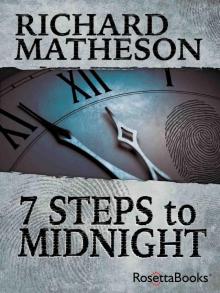 7 Steps to Midnight
7 Steps to Midnight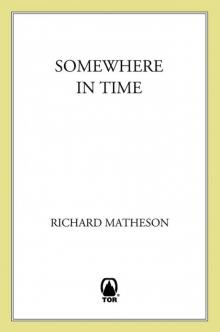 Somewhere in Time
Somewhere in Time Ride the Nightmare
Ride the Nightmare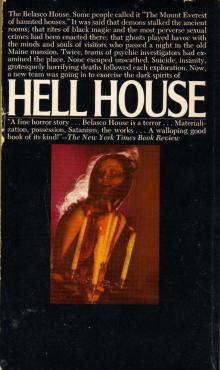 Hell House
Hell House Hunger and Thirst
Hunger and Thirst Lyrics
Lyrics Other Kingdoms
Other Kingdoms Now You See It . . .
Now You See It . . .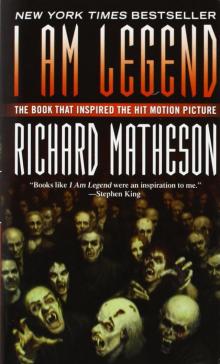 I Am Legend
I Am Legend The Box: Uncanny Stories
The Box: Uncanny Stories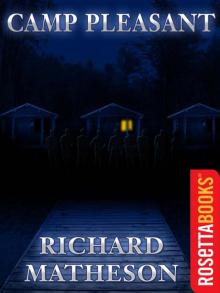 Camp Pleasant
Camp Pleasant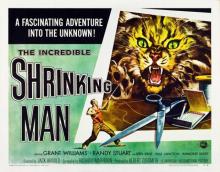 The Incredible Shrinking Man
The Incredible Shrinking Man What Dreams May Come
What Dreams May Come The Gun Fight
The Gun Fight Someone Is Bleeding
Someone Is Bleeding Mediums Rare
Mediums Rare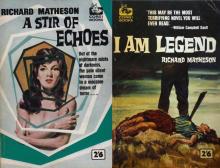 A Stir of Echoes
A Stir of Echoes Backteria and Other Improbable Tales
Backteria and Other Improbable Tales Offbeat: Uncollected Stories
Offbeat: Uncollected Stories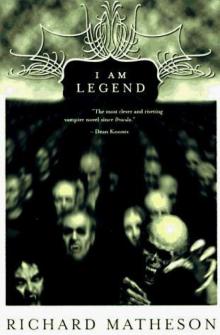 I Am Legend and Other Stories
I Am Legend and Other Stories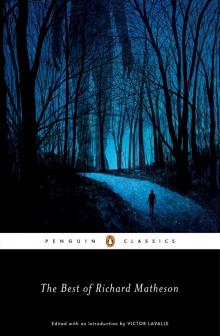 The Best of Richard Matheson
The Best of Richard Matheson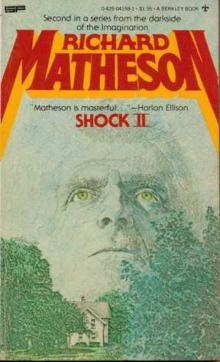 Shock II
Shock II Steel: And Other Stories
Steel: And Other Stories Richard Matheson Suspense Novels
Richard Matheson Suspense Novels The Link
The Link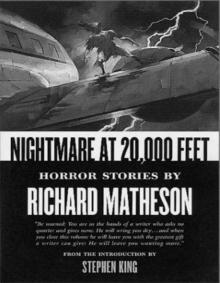 Nightmare At 20,000 Feet
Nightmare At 20,000 Feet Shadow on the Sun
Shadow on the Sun![Steel and other stories [SSC] Read online](http://i1.bookreadfree.com/i/03/21/steel_and_other_stories_ssc_preview.jpg) Steel and other stories [SSC]
Steel and other stories [SSC] Created By
Created By Offbeat
Offbeat Duel
Duel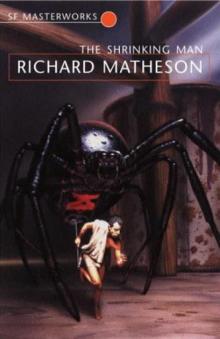 The Shrinking Man
The Shrinking Man Steel
Steel Now You See It
Now You See It